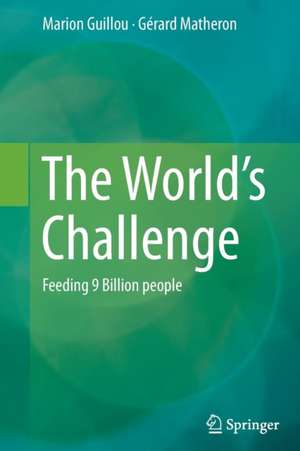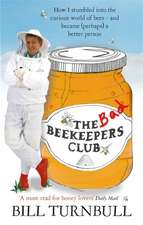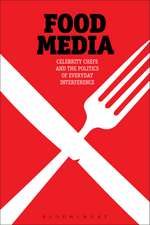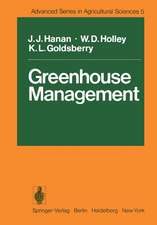The World’s Challenge: Feeding 9 Billion people
Autor Marion Guillou, Gérard Matheronen Limba Engleză Paperback – 17 sep 2016
| Toate formatele și edițiile | Preț | Express |
|---|---|---|
| Paperback (1) | 637.78 lei 6-8 săpt. | |
| SPRINGER NETHERLANDS – 17 sep 2016 | 637.78 lei 6-8 săpt. | |
| Hardback (1) | 647.40 lei 6-8 săpt. | |
| SPRINGER NETHERLANDS – 24 mar 2014 | 647.40 lei 6-8 săpt. |
Preț: 637.78 lei
Preț vechi: 750.33 lei
-15% Nou
Puncte Express: 957
Preț estimativ în valută:
122.05€ • 126.70$ • 101.77£
122.05€ • 126.70$ • 101.77£
Carte tipărită la comandă
Livrare economică 24 martie-07 aprilie
Preluare comenzi: 021 569.72.76
Specificații
ISBN-13: 9789402402667
ISBN-10: 9402402667
Pagini: 241
Ilustrații: XV, 226 p. 10 illus., 9 illus. in color.
Dimensiuni: 155 x 235 x 13 mm
Greutate: 0.35 kg
Ediția:Softcover reprint of the original 1st ed. 2014
Editura: SPRINGER NETHERLANDS
Colecția Springer
Locul publicării:Dordrecht, Netherlands
ISBN-10: 9402402667
Pagini: 241
Ilustrații: XV, 226 p. 10 illus., 9 illus. in color.
Dimensiuni: 155 x 235 x 13 mm
Greutate: 0.35 kg
Ediția:Softcover reprint of the original 1st ed. 2014
Editura: SPRINGER NETHERLANDS
Colecția Springer
Locul publicării:Dordrecht, Netherlands
Cuprins
Acknowledgements.- Introduction.- 1. Setting the stage.- 2. Eat well, eat better.- 3. Reducing losses and waste at consumption, distribution and processing levels.- 4. Reducing post-harvest losses in developing nations.- 5. Producing other goods.- 6. Managing ecosystem services.- 7. Will there be enough land?.- 8. The need to strive for productive yet ecological agriculture.- 9. Feeding the world starts with fighting poverty.- 10. Towards a global governance of food.- Conclusion.- References.- Glossary.
Notă biografică
Marion Guillou has been the President of the French National Institute for Agricultural Research (INRA) since 2004. A graduate of the École Polytechnique, she is an agricultural engineer and holds a doctorate in Food and Nutrition Sciences. Gérard Matheron has been the President of the French Agricultural Research Centre for International Development (CIRAD) since 2010. He is an agronomist and holds a doctorate in Quantitative Genetics.
Textul de pe ultima copertă
Is the world headed toward a major food crisis? After several decades of seeming indifference, public opinion is slowly awakening to the fact that a daunting task lies ahead.
If a global population of 9 billion by 2050 is to be fed adequately, more food must be produced, and this in keeping with increasingly stringent standards of quality and with respect for the environment. Not to mention the land that must be set aside for the production of energy resources, industrial goods, carbon storage and the protection of biodiversity.
To meet this challenge, societies must innovate, keep losses and waste in check, and reverse the current trend of excessive and imbalanced calorie intake. At the same time, the world must put an end to hunger and with it, the suffering of some one billion people.
Researchers the world over have dedicated their life’s work to finding viable solutions to these key issues on a global scale. In this work, the heads of two leading French agricultural research organisations, INRA and CIRAD, shed light on the issue in terms that are clear and accessible to the public at large. The reader will find a wealth of information, thought provoking insight and some surprising solutions. The world can avert a crisis, provided it makes a firm commitment to profound change, notably in the consumption and production habits of today’s western societies.
Marion Guillou has been the President of the French National Institute for Agricultural Research (INRA) since 2004. A graduate of the École Polytechnique, she is an agricultural engineer and holds a doctorate in Food and Nutrition Sciences.
Gérard Matheron has been the President of the French Agricultural Research Centre for International Development (CIRAD) since 2010. He is an agronomist and holds a doctorate in Quantitative Genetics.
If a global population of 9 billion by 2050 is to be fed adequately, more food must be produced, and this in keeping with increasingly stringent standards of quality and with respect for the environment. Not to mention the land that must be set aside for the production of energy resources, industrial goods, carbon storage and the protection of biodiversity.
To meet this challenge, societies must innovate, keep losses and waste in check, and reverse the current trend of excessive and imbalanced calorie intake. At the same time, the world must put an end to hunger and with it, the suffering of some one billion people.
Researchers the world over have dedicated their life’s work to finding viable solutions to these key issues on a global scale. In this work, the heads of two leading French agricultural research organisations, INRA and CIRAD, shed light on the issue in terms that are clear and accessible to the public at large. The reader will find a wealth of information, thought provoking insight and some surprising solutions. The world can avert a crisis, provided it makes a firm commitment to profound change, notably in the consumption and production habits of today’s western societies.
Marion Guillou has been the President of the French National Institute for Agricultural Research (INRA) since 2004. A graduate of the École Polytechnique, she is an agricultural engineer and holds a doctorate in Food and Nutrition Sciences.
Gérard Matheron has been the President of the French Agricultural Research Centre for International Development (CIRAD) since 2010. He is an agronomist and holds a doctorate in Quantitative Genetics.
Caracteristici
In this work, the heads of two leading French agricultural research organisations, INRA and CIRAD, shed light on the issue in terms that are clear and accessible to the public at large The reader will find a wealth of information, thought provoking insight and some surprising solutions This book presents how a global population of 9 billion by 2050 could be fed adequately, in keeping with increasingly stringent standards of quality and with respect for the environment Includes supplementary material: sn.pub/extras






